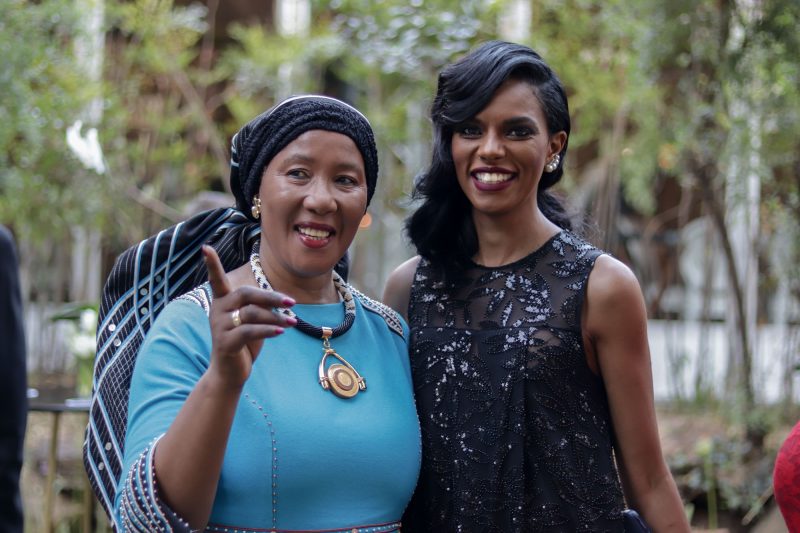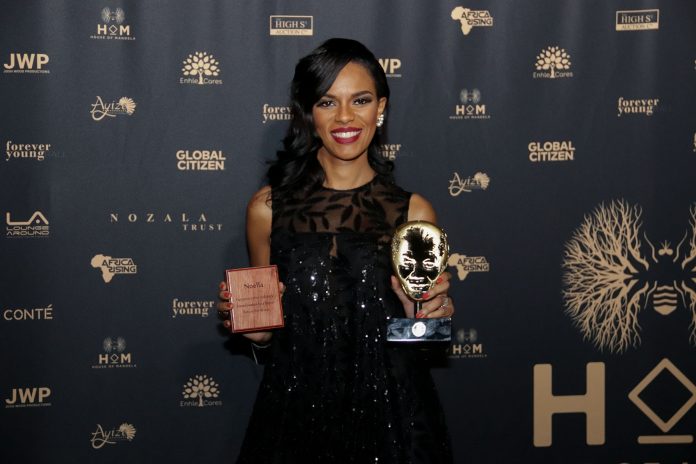IT IS one thing to be born in extreme poverty, and quite another to choose to rise above your painful past and turn around your life for the good of humanity. That’s how Congolese born model and humanitarian Noëlla Coursaris Musunka’s life journey penned out in the end.
Born in the Democratic Republic Of Congo to a Congolese mother and a Cypriot father 30-something years ago, Noella’s mother was unable to financially care for her after the death of her father at age 5. At a time when many children yearn for parental care and love, she was sent to live with relatives in Europe – first Belgium and later Switzerland.
Forced to escape the grim fate of “street girls” in Lubumbashi with nothing but “holes in her shoes” as she sets off for an unpredictable overseas journey, her mother believed she had better chances of making something of herself in Europe than in her native Congo.
Hardly into her teens, Musunka found herself having to work as a maid and a cleaner in between attending school in order to survive. “My father died when I was 5 and even as the only child, my mother couldn’t afford to raise me as she was living in extreme poverty. So she sent me to Europe,” she recalls during our brief sit-down at the Sandton’s Davinci Hotel just minutes upon landing for her week-long stay in South Africa.
“It was a very a tough childhood that I had, I still remember very well as I had to work as a maid most of my young life. But when I went back to the DRC to see my mother as a successful model after 13 years, I promised myself I wouldn’t only help her out. I knew I had to do something good in return for my country and help expose young girls to better opportunities I was lucky to have had.”

Fast forward three decades later, not only is Musunka a highly sought-after international model who has graced some of UK’s and US’s sought leading fashion and beauty magazines.
As the founder of Malaika, she runs one of the biggest girl-focused non-profit organizations in Africa – in her birth country. Situated within the impoverished community of Kalebuka, the organization empowers Congolese girls and their communities through education and health programs.
Sponsoring all expenses associated with their education (uniforms, under clothing, meals while at school and school supplies), Malaika is an independent community of its own, complete with a fully accredited school, designed by the New York-based studioMDA.
In 2013, Malaika partnered with FIFA Football for Hope movement to build the Kalebuka Football for Hope Center, a community empowerment hub offering health, entrepreneurship and sports programs to more than 5,000 youth and adults in the village.
Providing local community with the much-needed water infrastructure, Malaika has refurbished 17 water wells as part of a collaborative effort with the Voss and Vinmart foundations, providing clean water to 30,000 people a year.
“You see we have been building an entire village bit by bit,” she says as she shows me a catalog of photographs detailing Malaika’s journey over the past 11 years. “Before we could build the school, we needed a well because there was no water in the village. In the beginning, we were only sponsoring girls education, but because many of the girls were abandoned, and others sexually abused, it was becoming difficult to help and bring about real changes in their lives.
“So we decided to build our own programs from scratch addressing a number of issues they needed assistance with. You know, many of the students have absolutely nothing when they come to the school. So we teach the mothers to make the uniform for them. We give them shoes, underwear and two meals – breakfast and lunch – a day and most of it is taken from our garden.”

Indicative of the school’s commitment to the delivery of quality education, all the grade six learners achieve a 100% national exam pass rate every year, she further tells me.
“I don’t think it helps to build all these schools if the focus is not on quality education. And personally, I’ve been fortunate enough to be able to use my networks to bring about positive change in that regard. Africa really needs to strengthen the curriculum in schools in order to prepare for the 21 century. That’s the reason why as an educational institution, we put a great emphasis on teachers training.”
Currently serving as an ambassador for the Global Fund to fight HIV/Aids, tuberculosis and malaria, Musunka’s life story is nothing short of inspirational.
Asked how her tough upbringing has shaped her illustrious life, she says: “It was tough of course, as you can imagine I never got to celebrate any of my birthdays, nor did I even have toys as a child growing up. However, all of these experiences made me put a lot of emphasis on education. For someone with my background, I knew very early that in order to make it in life, I would have to be educated, which is why I decided to study business management while living in London.”
Initially, when she went to London, all Musunka wanted was to learn English and work for a bigger organization. But all changed when she landed her biggest modeling gig yet with British lingerie maker, Agent Provocateur.
“Although many people were discouraging me from doing modeling, it worked for me for a while, but after having my two children, I decided to take a break to focus on raising them as well as taking care of my third child, Malaika. But I’ve been kind of making a slow comeback to modeling, as you can see I’m the face of Black Opal and Max Factor. Besides, my daughter is four and she’s going back to school, which will allow me more time to focus on modeling, while busy setting up projects for Malaika.”

Musunka was recently in South Africa to receive an hounary award – during the jam-packed Global Citizen Festival weekend – for her humanitarian efforts across the African continent.
This was made possible by a philanthropic collaboration between the House of Mandela and Enhle Cares Foundation.
She says of her latest visit to South Africa: “It’s great to be in the ‘motherland’. As an African born in Congo, I grew up during the historic times of the late Nelson Mandela, which is the reason I’m here (as part of Mandela 100 Centenary celebrations) and Patrice Lumumba (DRC’s first and only elected Primi Minister).
“Just two weeks ago, I was with human rights activist, Dr. Denis Mukwege, from Congo who was recently awarded the Nobel Prize for 2018. Not only is he a great inspiration, he’s like a father figure to me. It’s truly amazing to have lived among such great icons, not to just post pictures on social media.
“They make us want to act, and make an impact on our immediate communities. As the new generation of Africans, we should also be united, which what’s what I teach to my kids.”
For Musunka, it’s not so much about the title of nobility that comes with receiving awards that matters most to her, but seeing Malaika positively touching hundreds of lives.
“To be honest, awards are not as much important to me as the work that we continue to do as an organization. To be able to achieve what we have with Malaika in the 11 years of our existence is really what drives me. Besides, it’s not just the work of one person, “but an amazing teamwork which involves people on the ground making things happen under very difficult conditions.”

Finding balance in all aspects of life is key
Reflective of her own journey as a young child wandering the world on her own, her advice to women trying to strike a balance between motherhood and successful careers is deeply centered around “our” natural role as mothers.
“You can become a powerful career woman for sure. However, it’s important that we strive to become the best mothers too to our children. You know, you can take your kids to the best schools but if they don’t have the love and attention of their parents, they will be broken kids.”
Passionate about inspiring true female leadership in Africa, her wish is to be able to do so without alienating the boy child in the process. “Of course we need more women in power, just as we want to see more female presidents in Africa.
“Just the other, my daughter woke up in the morning shouting, ‘Mommy, mommy’ women are the boss of the house. But I had to quickly correct her and said ‘hang on’, we are all equal you know. As a mother of a boy too, we need a place where men and women work together in harmony.
“In Africa, we don’t see a lot of that happening, and that’s something we should correct,” charges the doting married mother of two, who despite looking elegantly cool in jeans and ‘pink’ stilettos, insists – to my disbelief – that she was actually a tomboy growing up.
Well, that’s a story for another day! For now, we are happy to have her in our shores – heels or not – sharing her wisdom as a change maker the rest of the world admires.
*For brand focused South African news and heads-up on the great things your favourite lifestyle brands are doing to empower local communities, make sure to visit the Empower SA page daily!

